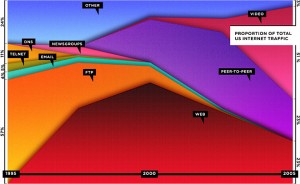
Secondo Wired, “The Web Is Dead. Long Live the Internet”.
Two decades after its birth, the World Wide Web is in decline, as simpler, sleeker services — think apps — are less about the searching and more about the getting. Chris Anderson explains how this new paradigm reflects the inevitable course of capitalism. And Michael Wolff explains why the new breed of media titan is forsaking the Web for more promising (and profitable) pastures.
Update: Boing Boing contro la infografica usata
Without commenting on the article’s argument, I nonetheless found this graph immediately suspect, because it doesn’t account for the increase in internet traffic over the same period. The use of proportion of the total as the vertical axis instead of the actual total is a interesting editorial choice.You can probably guess that total use increases so rapidly that the web is not declining at all.

by db
17 Ago 2010 at 18:02
Moto sì, famo una Harley 😀
by admin
17 Ago 2010 at 18:18
😀
by db
17 Ago 2010 at 19:09
l’header dice ancora moto, boh
by bruno lai
17 Ago 2010 at 20:12
Cerco di capire le unità di misura, che sono fondamentali… apparte che vorrei capire cosa si intende per Web, perchè per me è ancora il tutto, quindi, fatto il web al 100%, le percentuali delle altre cose dovrebbero essere meglio spiegate. Penso che siano più le mail che i video a farla da padrona, questo se valutiamo le unità prodotte, se si valuta il peso in tera, allora, ovvio che mi aspetto i video. In tal caso la ricerca interessante direbbe che i video pesano più delle mail 🙂 fantastico direbbe Luttazzi 🙂 eh eh…
by admin
17 Ago 2010 at 22:42
Dario, sistemato (non pesca dal titolo del post ma da un plugin seo ad hoc), grazie 😀
Pingback
by Il web non è morto, Internet è cambiata | Telcoeye di Massimo Cavazzini
18 Ago 2010 at 12:34
[…] le reazioni all’articolo “The Web is dead. Long live the Internet” di Anderson e Wolff su Wired. Dire che il Web è morto è, ovviamente, una provocazione che […]